Traumatic brain injury (TBI) occurs when sudden trauma damages the brain. While mild TBI can temporarily affect brain cells, more serious injuries can lead to bleeding, torn tissue, and bruising which can cause lasting complications. Brian damage studies have shown that stem cells may be an alternative option for patients to explore.
According to research, exogenous stem cells can target damaged brain tissue. They can then partake in the repair process by differentiating into cells that replaced the damaged tissue, while simultaneously releasing anti-inflammatory properties. These effects have the ability to promote improvements in neurological function in people with TBI.
Several types of stem cells have been studied for TBI, including:
- Mesenchymal Stem Cells: Typically retrieved from adult bone marrow, mesenchymal stem cells (MSCs) aid in tissue regeneration, the inhibition of inflammation, and the recruitment of progenitor cells to replace lost cells. Other studies have shown improvement in neurological function after MSC treatment was administered.
- Neural Stem Cells: Neural stem cells (NSCs) self-renew and can differentiate into different types of cells, including neurons. According to results from animal studies, transplanted NSCs were able to mature into different brain cells and survive for at least five months. Studies have also shown that NSC injection enhances cognitive and learning abilities, as well as motor function.
- Multipotent Adult Progenitor Cells: Known for their ability to differentiate into endothelial cells, multipotent adult progenitor cells (MAPCs) have been shown to improve memory retrieval, the ability to retain information, spatial learning, and dyskinesia (impairment of voluntary movement). These cells have particularly powerful anti-inflammatory response characteristics.
- Induced Pluripotent Stem Cells: In 2007, Japanese scientists reprogramed somatic cells into a new class that resembled embryonic stem cells, known as induced pluripotent stem cells (iPSCs). Using the TBI model, researchers have determined that iPSCs could improve neurological function after transplanted into the injured area and specifically enhance motor function.
- Endothelial Progenitor Cells: Endothelial progenitor cells (EPCs) are the precursors of vascular endothelial cells found in the bone marrow. They are recruited to the site of injury, especially after brain injury. In a brain injury model, endothelial colony-forming cells (ECFCs) showed an ability to home in on the injured area and repair the blood-brain barrier. They can enhance capillary formation and reduce inflammation.
While further research is needed on these methods of stem cell therapy, early results do show promise in their benefits for those exploring regenerative medicine options for Traumatic Brain Injury. Contact a Care Coordinator today for a free assessment!


 St. Petersburg, Florida
St. Petersburg, Florida
